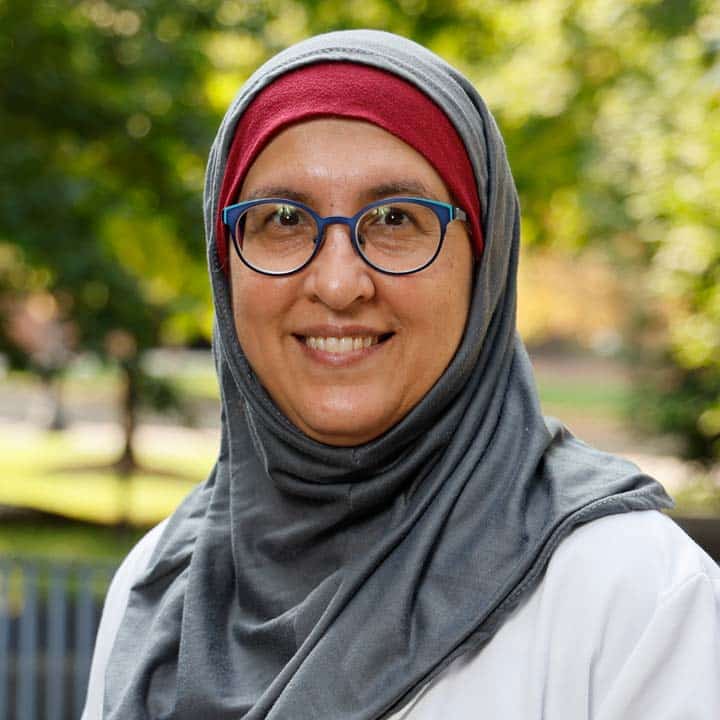Master of Arts in Bioethics

March 1, 2026
May 11, 2026
Overview
The Master of Arts (MA) in Bioethics degree is an innovative multi- and interdisciplinary program offered by The Ohio State University’s College of Medicine. With no residency requirements, this program is available entirely online to health-care professionals, research scientists, legal and policy professionals, graduate students, and others. Through small classes with meaningful access to Ohio State faculty, this program presents both reflective engagement with ethical issues, as well as forward-looking approaches to the ethical questions and puzzles prominent in the diverse realms of medicine, health care, biomedical research and life sciences. The course offerings allow you to focus on clinical medical ethics, research ethics and other areas of bioethics. With this flexible master’s program, you can choose a course load each semester that meets your career and life demands. Most students complete this program in 4-6 semesters, however, it can be completed in as little as 3 semesters.
The core program goals are:
- To identify common moral problems and ethical issues in research, medicine, health care, and the life sciences
- To distinguish ethical questions from scientific and/or legal questions
- To contribute towards moral research & health care policies informed by both empirical & theoretical scholarship in bioethics
Frequently Asked Questions
Please find key information about the online Master of Arts in Bioethics program below.
The bioethics program is 100% online and asynchronous (with the exception of one elective) to offer the most flexibility for busy students. Though the courses are structured and there are deadlines for assignments, you will not be required to be online at specific times.
Yes! While a background in bioethics certainly helps, it is not a requirement. Our students come from a wide range of professional and academic backgrounds, as do our faculty. We welcome anyone with an interest in bioethics to apply.
Courses and admission for the Master of Arts in Bioethics are available year-round in the spring, summer, and autumn semesters.
Once you submit your contact information, a dedicated Enrollment Advisor will connect with you shortly to provide more details about this online program, provide one-on-one guidance, and answer any questions you may have as you navigate the application process. Learn more about the support an Enrollment Advisor offers.
Related Content
Related Content

Why Olympic athlete Emma Maltais chose to earn her Master’s in Bioethics online
Meet a 2023 graduate of Ohio State’s Master of Arts in Bioethics online program and learn how she’s applying this dynamic and interdisciplinary degree.

What can you do with a Bioethics Master’s Degree?
Learn about student experiences and career outcomes from alumni of the online Master of Arts in Bioethics at Ohio State.

Meet your future instructor: Dr. Ryan Nash
Learn about Ohio State’s online Master of Bioethics program from one of our passionate faculty members, Dr. Ryan Nash.
Academic Calendar
The Master of Arts in Bioethics program offers the flexibility of enrolling in three terms each year: spring, summer, and autumn.
Academic Calendar
The Master of Arts in Bioethics program offers the flexibility of enrolling in three terms each year: spring, summer, and autumn.
Admission Criteria
The Online Master of Arts in Bioethics program requires the following requirements for admission:
- Bachelor’s or advanced degree from an accredited college or university
- A minimum 3.0 cumulative GPA for the last bachelor’s or advanced degree earned
- Additional English language testing requirements if applicable (relevant for international students)
For your application, you will be required to submit:
- Transcripts: Transcripts or other credentials documenting that you have completed prior academic work.
- To complete your application and verify your degree and undergraduate GPA, you must submit transcripts from all educational institutions you have attended.
- Transcripts should be submitted directly by the sending institution by mail or electronic transfer to be considered official. Please request your transcripts be sent early so they arrive before the deadline.
- For U.S. institutions: Transcripts can be sent electronically from the issuing institution directly to gpadocs@osu.edu or mailed directly from the issuing institution to:
The Ohio State University
Graduate Admissions Office
P.O. Box 182004
Columbus, OH 43218-2004 - For international institutions: Send copies of international transcripts, diplomas or degree certificates and English translations in sealed university envelopes to:
Graduate and Professional Admissions
The Ohio State University
Student Academic Services Building
281 W. Lane Ave.
Columbus, OH 43210-1132 USA - When applying:
- You may upload scanned copies of official transcripts, diplomas, or degree certificates to the online application system.
- These scans help form a complete application packet, but they do not replace the need for official documents.
- What is not accepted:
- Advising reports
- Unofficial transcripts or scans labeled “UNOFFICIAL”
- Documents with a URL across the top
- Transcripts missing the institution’s name, seal, stamp, or GPA
- These types of documents will not be used for degree verification or GPA calculation.
- Exception: You do not need to submit transcripts for coursework or degrees earned from The Ohio State University.
- To complete your application and verify your degree and undergraduate GPA, you must submit transcripts from all educational institutions you have attended.
- Résumé or Curriculum Vitae (CV): Provide a current version highlighting relevant academic, professional, and/or research experience.
- Letters of Recommendation: Two letters are required. While there are no specific source requirements, recommenders should be individuals who can speak to your potential for success in the program. Academic or professional references are generally most appropriate. You will enter your recommenders’ contact information in the application. Once your application is submitted, they will be contacted directly by Ohio State with instructions for uploading their letters.
- Statement of Purpose: Share what draws you to this program, the qualifications and experiences that have prepared you for graduate study, and any other background the admissions committee should consider. The statement should not exceed two pages. If your cumulative GPA is below 3.0, please also address your academic history and any relevant circumstances.

The Ohio State University participates in the State Authorization Reciprocity Agreements (SARA).
SARA is a national initiative that increases student access to distance education courses and programs while maintaining compliance with state regulations. Institutions participating in SARA can offer educational opportunities in all 49 SARA member states, the District of Columbia, the U.S. Virgin Islands and Puerto Rico without seeking individual approval in each state.
California is not a SARA member state, however, OSU may offer online courses and programs to students located in California under the California Private Post-Secondary Act of 2009.
The Application Process
Once you understand your program’s admission criteria, please note the application deadline. You’ll need a quiet space and a variety of materials for your application. To learn more, please see our Admissions page for the full process. Ready to Apply? Find your application here.
Career Outlook
The career outlook for individuals holding a Master of Arts in Bioethics is increasingly promising, driven by the growing complexity of ethical issues in various sectors. As advancements in medical and biological sciences continue to evolve, there is a heightened need for experts who can address and navigate the ethical dilemmas these innovations present. Professionals with a Master of Arts in Bioethics find opportunities across a range of fields, including health care, academia, research, law, and public policy.
Top Occupations by Median Income
What They Do
Provide healthcare services typically performed by a physician, under the supervision of a physician. Conduct complete physicals, provide treatment, and counsel patients. May, in some cases, prescribe medication. Must graduate from an accredited educational program for physician assistants.
Work Activities
Make tentative diagnoses and decisions about management and treatment of patients. Interpret diagnostic test results for deviations from normal. Prescribe therapy or medication with physician approval.
Wage Range
- Entry Level: $95,240
- Mid Level: $133,260
- Senior Level: $182,200
Job Outlook
Bright
Related Careers
- Cardiologists
- Emergency Medicine Physicians
- Family Medicine Physicians
- Nurse Practitioners
- Pediatric Surgeons
Job Sectors
- Medicine and Dentistry
- Biology
- English Language
- Psychology
- Therapy and Counseling
What They Do
Diagnose diseases and conduct lab tests using organs, body tissues, and fluids. Includes medical examiners.
Work Activities
Examine microscopic samples to identify diseases or other abnormalities. Diagnose diseases or study medical conditions, using techniques such as gross pathology, histology, cytology, cytopathology, clinical chemistry, immunology, flow cytometry, or molecular biology. Write pathology reports summarizing analyses, results, and conclusions.
Wage Range
- Entry Level: $83,930
- Mid Level:
- Senior Level:
Job Outlook
Bright
Related Careers
- Cardiologists
- Histotechnologists
- Medical and Clinical Laboratory Technologists
- Pediatric Surgeons
- Radiologists
Job Sectors
- Medicine and Dentistry
- Biology
- English Language
- Customer and Personal Service
- Education and Training
What They Do
Make immediate medical decisions and act to prevent death or further disability. Provide immediate recognition, evaluation, care, stabilization, and disposition of patients. May direct emergency medical staff in an emergency department.
Work Activities
Analyze records, examination information, or test results to diagnose medical conditions. Assess patients' pain levels or sedation requirements. Collect and record patient information, such as medical history or examination results, in electronic or handwritten medical records.
Wage Range
- Entry Level: $114,680
- Mid Level:
- Senior Level:
Job Outlook
Average
Related Careers
- Anesthesiologists
- Family Medicine Physicians
- General Internal Medicine Physicians
- Pediatricians, General
- Physician Assistants
What They Do
Diagnose, treat, and provide preventive care to individuals and families across the lifespan. May refer patients to specialists when needed for further diagnosis or treatment.
Work Activities
Prescribe or administer treatment, therapy, medication, vaccination, and other specialized medical care to treat or prevent illness, disease, or injury. Order, perform, and interpret tests and analyze records, reports, and examination information to diagnose patients' condition. Collect, record, and maintain patient information, such as medical history, reports, or examination results.
Wage Range
- Entry Level: $81,330
- Mid Level: $238,380
- Senior Level:
Job Outlook
Average
Related Careers
- Emergency Medicine Physicians
- General Internal Medicine Physicians
- Obstetricians and Gynecologists
- Pediatric Surgeons
- Pediatricians, General
Job Sectors
- Medicine and Dentistry
- English Language
- Therapy and Counseling
- Biology
- Psychology
What They Do
Plan, direct, or coordinate clinical research projects. Direct the activities of workers engaged in clinical research projects to ensure compliance with protocols and overall clinical objectives. May evaluate and analyze clinical data.
Work Activities
Schedule subjects for appointments, procedures, or inpatient stays as required by study protocols. Perform specific protocol procedures such as interviewing subjects, taking vital signs, and performing electrocardiograms. Assess eligibility of potential subjects through methods such as screening interviews, reviews of medical records, or discussions with physicians and nurses.
Wage Range
- Entry Level: $79,830
- Mid Level: $161,180
- Senior Level:
Job Outlook
Bright
Related Careers
- Clinical Data Managers
- Clinical Nurse Specialists
- Health Informatics Specialists
- Health Specialties Teachers, Postsecondary
- Social Science Research Assistants
Job Sectors
- Customer and Personal Service
- English Language
- Administrative
- Medicine and Dentistry
What They Do
Assess patient health problems and needs, develop and implement nursing care plans, and maintain medical records. Administer nursing care to ill, injured, convalescent, or disabled patients. May advise patients on health maintenance and disease prevention or provide case management. Licensing or registration required.
Work Activities
Record patients' medical information and vital signs. Administer medications to patients and monitor patients for reactions or side effects. Maintain accurate, detailed reports and records.
Wage Range
- Entry Level: $66,030
- Mid Level: $93,600
- Senior Level: $135,320
Job Outlook
Bright
Related Careers
- Acute Care Nurses
- Clinical Nurse Specialists
- Critical Care Nurses
- Licensed Practical and Licensed Vocational Nurses
- Nurse Practitioners
Job Sectors
- Psychology
- Customer and Personal Service
- Medicine and Dentistry
- English Language
- Administrative
What They Do
Conduct research dealing with the understanding of human diseases and the improvement of human health. Engage in clinical investigation, research and development, or other related activities.
Work Activities
Follow strict safety procedures when handling toxic materials to avoid contamination. Evaluate effects of drugs, gases, pesticides, parasites, and microorganisms at various levels. Plan and direct studies to investigate human or animal disease, preventive methods, and treatments for disease.
Wage Range
- Entry Level: $61,860
- Mid Level: $100,590
- Senior Level: $168,210
Job Outlook
Bright
Related Careers
- Biochemists and Biophysicists
- Epidemiologists
- Geneticists
- Microbiologists
- Physicians, Pathologists
Job Sectors
- Biology
- English Language
- Medicine and Dentistry
- Chemistry
- Mathematics
What They Do
Represent clients in criminal and civil litigation and other legal proceedings, draw up legal documents, or manage or advise clients on legal transactions. May specialize in a single area or may practice broadly in many areas of law.
Work Activities
Interpret laws, rulings and regulations for individuals and businesses. Analyze the probable outcomes of cases, using knowledge of legal precedents. Gather evidence to formulate defense or to initiate legal actions by such means as interviewing clients and witnesses to ascertain the facts of a case.
Wage Range
- Entry Level: $72,780
- Mid Level: $151,160
- Senior Level:
Job Outlook
Average
Related Careers
- Administrative Law Judges, Adjudicators, and Hearing Officers
- Arbitrators, Mediators, and Conciliators
- Claims Adjusters, Examiners, and Investigators
- Judges, Magistrate Judges, and Magistrates
- Judicial Law Clerks
Job Sectors
- Law and Government
- English Language
- Customer and Personal Service
- Administrative
- Computers and Electronics
What They Do
Diagnose, treat, and help prevent diseases and injuries in children. May refer patients to specialists for further diagnosis or treatment, as needed.
Work Activities
Prescribe or administer treatment, therapy, medication, vaccination, and other specialized medical care to treat or prevent illness, disease, or injury in infants and children. Examine children regularly to assess their growth and development. Treat children who have minor illnesses, acute and chronic health problems, and growth and development concerns.
Wage Range
- Entry Level: $96,240
- Mid Level: $210,130
- Senior Level:
Job Outlook
Below Average
Related Careers
- Emergency Medicine Physicians
- Family Medicine Physicians
- General Internal Medicine Physicians
- Neurologists
- Pediatric Surgeons
Job Sectors
- Medicine and Dentistry
- Therapy and Counseling
- Biology
- Psychology
- Customer and Personal Service
What They Do
Provide medical care related to pregnancy or childbirth. Diagnose, treat, and help prevent diseases of women, particularly those affecting the reproductive system. May also provide general care to women. May perform both medical and gynecological surgery functions.
Work Activities
Treat diseases of female organs. Care for and treat women during prenatal, natal, and postnatal periods. Analyze records, reports, test results, or examination information to diagnose medical condition of patient.
Wage Range
- Entry Level: $94,750
- Mid Level:
- Senior Level:
Job Outlook
Average
Related Careers
- Cardiologists
- Emergency Medicine Physicians
- General Internal Medicine Physicians
- Pediatric Surgeons
- Pediatricians, General
Job Sectors
- Medicine and Dentistry
- Biology
- English Language
- Psychology
- Customer and Personal Service
National occupational information in Ohio State Online’s Career Outlook tool is sourced from O*NET Online and the U.S. Bureau of Labor Statistics (BLS). The median annual wage displayed to the right of each occupational title above is based on the BLS Employment Projections program. Outlook and percent change indicate projected growth or decline over the next 10 years.
Curriculum – Core Courses
The online Master of Arts in Bioethics curriculum is designed to help you identify and navigate moral and ethical issues across various sectors. You with take a total of 15 credit hours in core courses.
Philosophical survey of the moral foundations of contemporary bioethics theories and health care policies.
Examination of importance of ethics in research concerning advanced biomedical sciences, public regulation, and more.
Exploration of major clinical ethical issues confronting the practices of medical and biomedical science.
Instructs students in rudimentary legal research skills, constitutional foundations of health care law applicable to some classical and contemporary legal issues, and an overview of the structures of the legal system of the United States.
This unique course follows a longitudinal format with monthly 3-hour lectures, presentations, panel discussions, and/or debates led by various OSU faculty and guest lecturers. The intent of the course is to present to students a wide exposure to the most relevant, contemporary, and controversial topics in bioethics presented from a wide array of experts in the disciplines intersecting bioethics.
This unique Symposium II course follows a longitudinal format with monthly 3-hour lectures, presentations, panel discussions, and/or debates led by various OSU faculty and guest lecturers.
Elective Courses
Please note these are elective courses which may not be offered every semester. You will take a total of 12 credit hours in electives.
This course serves to introduce students to the study of neuroethics, which concerns itself with ethical problems arising at the interface between philosophy and neuroscience. Reading broadly, it explores both how philosophy animates ethical discussion within neuroscience as well as how neuroscience has much to say to philosophers.
This course offers an advanced introduction to disability bioethics. Students will become familiar with some of the central debates in contemporary disability bioethics. Topics may include: competing models of disability; whether, all things equal, having a disability make one’s life worse; if it is permissible to try and “treat” or “cure” disabilities.
To understand neuroscience is also to understand its impact on society. This course will examine the broader situation of contemporary neuroscience via the history of the field, how it is practiced now, and what that means looking towards the future. Students will engage with multiple disciplines to cultivate critical thinking, deepen awareness of their studies, and develop as professionals.
As Artificial Intelligence is integrated into healthcare, new and old ethical challenges have arisen. Students will explore AI’s promise and perils by evaluating how AI tools are, and may be, used in medical treatment, clinical research, and bioethics itself. In so doing, we will evaluate how AI performs ethical reasoning and presents new benefits and risks to moral judgment and decision-making.
Building upon Clinical Bioethics (BIOETHIC 6020), this course will engage students in the more advanced processes and procedures of clinical ethical analysis, focusing on ethical reflection, negotiation, and decision making in clinical ethical scenarios. Theoretical frameworks, concepts, and applied analytical strategies will be examined in light of their usefulness for practice.
Over 2/3rds of clinical ethics dilemmas involve end-of-life decision-making. End-of-life care and palliative care are growing fields. This course will engage the essential ethics issues involved in end-of-life care. Clinical cases and medical knowledge will be explored. The prevailing procedural ethics of our time will be utilized to discuss ethical dilemmas.
The main goal of this course is to explore the historical roots of the field of bioethics. The course will be divided into a few main parts, including a broad survey of key figures and movements in medical history from antiquity to modernity, including the Hippocratics, Galenic medicine, the birth of dissection, Christian hospitality, Medieval medicine, modern surgery, the age of antibiotics, etc.
This course is designed to allow students an in-depth study of one of the most troubling periods in the history of medicine the active participation of physicians in the Holocaust. We will attempt to understand the distorted rational behind this genocide by ordinary men and women. We will also discuss, in depth, analogies to today’s medical practice.
This course focuses on key ethical issues surrounding women’s health and the pre, peri, and post-natal care of the mother and the newborn, including but not limited to ethics of: pre-implantation genetic diagnosis, prenatal diagnosis, maternal decision making, invetro fertilization, prenatal diagnosis, fetal treatment/surgery, neonatal care, genetic counseling, gene therapy, and genetic testing.
This course addresses the discourses and interplay of secular, religious, and theological perspectives in the field of bioethics. One central goal of this course is to identify the thought and language of secular, immanent bioethics in comparison/contrast with religious, transcendent bioethics without glossing the thick plurality of religious differences and perspectives in the major religions
This course will survey the writings of the various president’s bioethics councils beginning in 1974 to the most recent bioethics commission established by President Obama.
This course will delve deeply into the text of the Belmont Report, including reading essays in the appendices of the report and additional outside material.
This course serves as a theory-intensive overview of the major topics of animal bioethics. Students will study the foundations of the field by examining arguments about moral status, normative frameworks, and the metaphysical characteristics of non-human animals. The course emphasizes the application of these motifs in the clinic space, the laboratory, and the larger context of animals in society.
Students will explore the variety of methods used to address ethical concerns surrounding clinical care, biomedical research, and health care policy. The course will equip students with analytic and practical skills to engage in research of their own.
Explore the tensions in a democracy, as rule by the people, on matters of scientific knowledge and authority. Can a democracy answer complex moral questions requiring technical knowledge, as in gene editing and artificial womb technology? We will explore the executive branch’s regulatory institutions, the legislature, the judiciary, the public itself, and finally, deliberative democratic forums.
Disasters and humanitarian crises raise a host of ethical issues that are often distinct from those in clinical settings. This course will examine some of these issues as they arise during pandemics, natural disasters and humanitarian crises.
This course emphasizes learn-by-doing approach to conflict resolution through online and on-site elements. The course familiarizes participants with a ‘toolbox’ of skills essential to conflict resolution applicable to bioethics consultations. Pre-req: 6020, or permission of instructor. This course has a synchronous online component.
The course aims to give students the ethical background to lead in an ongoing national dialogue about the ethical, legal, and social implications of advances in genomic technology, reproductive health and the professional responsibility of counseling.
This course of directed readings provides additional research preparation for a particularly high-level MA Thesis. Admission to this course requires a sponsoring faculty member and approval from the Director of the MA program. The Syllabus for this course will be written in conjunction between the student and sponsoring faculty member and approved by the Director of the MA program. Pre-req: 6000-level BioEthc course, or approval of Program Director.
Capstone
Lastly, you will complete a 3-credit-hour capstone, choosing either a thesis or non-thesis option. If you choose the thesis track, one of your elective courses must be Directed Readings in Bioethics (course 8000).
Alongside the MA Thesis Project, the Ethics Practicum is one of two possible capstone projects in the MA program. Having selected the Ethics Practicum, students have two options or fields of focus for the practicum: clinical ethics or research ethics. Both areas of focus for the practicum are based upon a Personal Learning Plan (PLP) developed in collaboration with a supervisor. Pre-req: BioEthc 6000-level course.
The master’s thesis is a carefully argued scholarly paper of approximately 12,000 to 13,000 words (roughly 50 pages). Students will work under the supervision of a faculty adviser to craft and write an original argument with sources. The thesis must have a substantial research component and a focus on a suitable topic within the field of bioethics as a final element in the master’s degree.
Understanding Online Course Types
As you research the right online program for you, you likely will come across the terms “asynchronous” and “synchronous.” Learn what these terms mean and how they’re important to consider when understanding how a program will fit into your life.
Learn More

Program Faculty
The faculty members of the online Master of Arts in Bioethics program bring a wealth of knowledge and experience from a wide range of disciplines. Their deep and varied expertise spans law, policy, medicine, religion, public and global health, medical humanities, research, and philosophy. This diverse background not only enriches the academic environment but also ensures a comprehensive and interdisciplinary approach to bioethical education and research. You will benefit from the faculty’s extensive experience and insights, gaining a well-rounded understanding of the complex and multifaceted issues within the field of bioethics.

Courtney Thiele, JD, MA
Bioethics Graduate Programs Director and Assistant Professor
Courtney Thiele is the Director of the Bioethics Graduate Programs as well as an Assistant Professor for the Master of Arts in Bioethics. She is also the Interim Director for the Division of Bioethics and Vice Chair for Faculty Success.
Ryan Nash, MD, MA, FACP, FAAHPM
Interim Chair and Associate Professor with Tenure, Department of Biomedical Education and Anatomy
Ashley Fernandes, MD, PhD, FAAP
Associate Director, Center for Bioethics
Martin Fitzgerald, PhD
Assistant Professor, Division of Bioethics
Abraham Graber, PhD
Associate Professor, Division of Bioethics
Dana Howard, PhD
Assistant Professor, Division of Bioethics
Asma Mobin-Uddin, MD, MA, FAAP
Assistant Professor, Division of Bioethics
Naomi Scheinerman, PhD
Assistant Professor, Division of Bioethics
Nicole Shirilla, MD, MA, MEd
Clinical Assistant Professor, Division of Bioethics
Shameka Poetry Thomas, PhD
Instructor, Division of Bioethics
Matthew Vest, PhD
Assistant Professor, Division of Bioethics
Testimonials
The Master of Arts in Bioethics at Ohio State is an interdisciplinary and fully online master’s degree designed for health care professionals, researchers, legal professionals, social scientists, or anyone with an interest in engaging with questions in bioethics.
See what real students and graduates have to say about Ohio State’s online Master of Arts in Bioethics.

Hear from Real Students
“The bioethics master’s program made me a better physician. Now that I have the training, I can have those difficult conversations with my staff and the families and try to provide closure.”

"From climate change to humanitarian crises to social injustice, bioethics serves a vital role as we think about how life can flourish. Studying in this program will give you new ways of thinking about old problems and help you to always approach new challenges with a critical and open mind."

"The work can be incredibly challenging at times. But if we don’t do it, who would? And what would be the consequence if people weren’t willing to engage on matters that can be challenging?"

"The bioethics master's program made me a better physician. Now that I have the training, I can have those difficult conversations with my staff and the families and try to provide closure."
Tuition fees are subject to change. The table above serves as a guide and not an official bursar’s bill. Full-Time costs are total tuition costs per semester.
Financial Aid Resource
Financial Aid Resource
Related Articles
Related Articles

How to ask your employer for tuition reimbursement
How to Pay for Your Online Program

Tips for Online Learning from Ohio State Students and Faculty
Get Started
Connect with a knowledgeable Enrollment Advisor who can help answer your questions and explain different aspects of the more than 80 online degrees and certificates offered at Ohio State. They are here to help you on your education journey.



